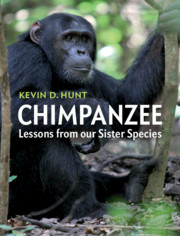Book contents
- Chimpanzee
- Reviews
- Chimpanzee
- Copyright page
- Dedication
- Contents
- Foreword
- Preface
- Acknowledgments
- 1 Sister’s Keeper
- 2 Wild Lesson
- 3 A Most Surprising Creature
- 4 Kin
- 5 Scratching Out a Living in an Unforgiving World
- 6 Guts, Glorious Guts, Large Stomach, and Colon
- 7 Thews, Sinews, and Bone
- 8 Arboreal Gathering, Terrestrial Traveling
- 9 Forged in Nature’s Cauldron
- 10 Up from the Protoape
- 11 Building a Natural Wonder
- 12 The Source of Similarity
- 13 Making Your Way in the Great Wild World
- 14 The Grim Reaper in the Forest Primeval
- 15 Powering Life
- 16 Shelter from the Storm
- 17 Meat-Seeking Missiles
- 18 The Mind of the Chimpanzee
- 19 The Brain of the Chimpanzee
- 20 Tired Nature’s Sweet Restorer
- 21 Chimpanzee Thought Transfer
- 22 Ape Implements
- 23 Wisdom of the Ages
- 24 The Daily Grind
- 25 A Nation at War with Itself
- 26 The Sporting Chimpanzee
- 27 The Passion of Pan
- 28 Into the Light
- 29 The Other Sister, Bonobos
- 30 Sister Species
- Book part
- Index
- Plate Section (PDF Only)
- References
3 - A Most Surprising Creature
The Discovery of the Chimpanzee
Published online by Cambridge University Press: 10 July 2020
- Chimpanzee
- Reviews
- Chimpanzee
- Copyright page
- Dedication
- Contents
- Foreword
- Preface
- Acknowledgments
- 1 Sister’s Keeper
- 2 Wild Lesson
- 3 A Most Surprising Creature
- 4 Kin
- 5 Scratching Out a Living in an Unforgiving World
- 6 Guts, Glorious Guts, Large Stomach, and Colon
- 7 Thews, Sinews, and Bone
- 8 Arboreal Gathering, Terrestrial Traveling
- 9 Forged in Nature’s Cauldron
- 10 Up from the Protoape
- 11 Building a Natural Wonder
- 12 The Source of Similarity
- 13 Making Your Way in the Great Wild World
- 14 The Grim Reaper in the Forest Primeval
- 15 Powering Life
- 16 Shelter from the Storm
- 17 Meat-Seeking Missiles
- 18 The Mind of the Chimpanzee
- 19 The Brain of the Chimpanzee
- 20 Tired Nature’s Sweet Restorer
- 21 Chimpanzee Thought Transfer
- 22 Ape Implements
- 23 Wisdom of the Ages
- 24 The Daily Grind
- 25 A Nation at War with Itself
- 26 The Sporting Chimpanzee
- 27 The Passion of Pan
- 28 Into the Light
- 29 The Other Sister, Bonobos
- 30 Sister Species
- Book part
- Index
- Plate Section (PDF Only)
- References
Summary
We have known that chimpanzees exist for centuries (see Yerkes & Yerkes, 1929 for the definitive review of great ape historical scholarship; also, Reynolds, 1967; Hill, 1969; Goodall, 1986). In the course of that time they have been discovered, rediscovered, confused with humans, confused with orangutans, portrayed as mythical monsters, and transported across seas merely to amuse royalty. Many of them ultimately achieved a sort of immortality as museum specimens.
- Type
- Chapter
- Information
- ChimpanzeeLessons from our Sister Species, pp. 20 - 39Publisher: Cambridge University PressPrint publication year: 2020



